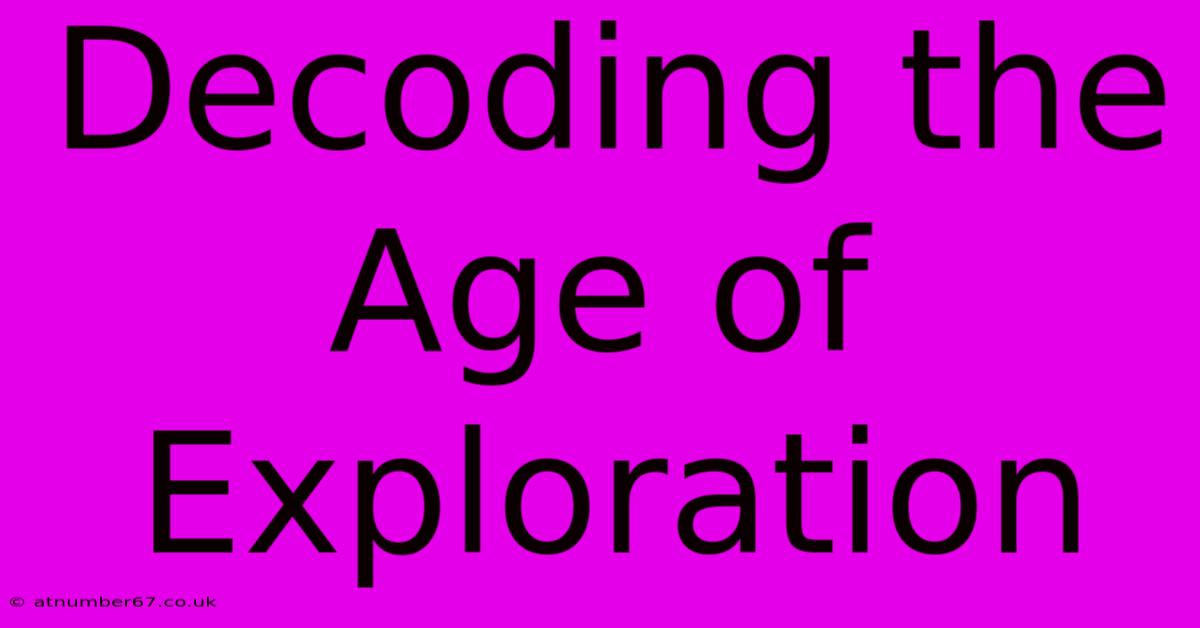Decoding The Age Of Exploration

Table of Contents
Decoding the Age of Exploration: A Journey Through History
The Age of Exploration, a period spanning roughly from the 15th to the 17th centuries, represents a pivotal moment in human history. Driven by a potent mix of ambition, technological advancement, and economic incentives, European powers embarked on voyages of discovery that reshaped the world map and irrevocably altered the course of global civilization. This exploration wasn't just about charting new lands; it was a complex interplay of cultural exchange, economic exploitation, and the birth of globalization.
The Drivers of Exploration: More Than Just Gold and Glory
While popular imagination often focuses on the romantic quest for gold and glory, the Age of Exploration was fueled by a multitude of factors. Economic motivations were paramount. The demand for spices, silks, and other luxury goods from the East drove European powers to seek new trade routes, bypassing the established, and often expensive, land routes controlled by the Ottoman Empire.
Key Economic Factors:
- The Spice Trade: The lucrative spice trade, particularly for pepper, cloves, and nutmeg, was a major incentive. Controlling these trade routes promised immense wealth and power.
- The Search for New Resources: Europe needed access to raw materials like timber and precious metals to fuel its growing economies.
- Mercantilism: The dominant economic theory of the time, mercantilism, emphasized the accumulation of wealth through trade and colonization.
Beyond economics, technological advancements played a crucial role. Improvements in shipbuilding, navigation, and cartography made long-distance voyages feasible.
Key Technological Advancements:
- The Caravel: This maneuverable ship, equipped with lateen sails, allowed for exploration of diverse wind patterns.
- The Astrolabe and Sextant: These navigational instruments enabled sailors to determine latitude and navigate more accurately.
- Improved Cartography: The development of more accurate maps was essential for planning and executing long voyages.
Political ambitions also drove exploration. European monarchs sought to expand their empires, gain prestige, and compete with rival nations. The establishment of colonies provided new sources of wealth, manpower, and strategic advantage.
The Impact of Exploration: A Legacy of Change
The Age of Exploration had a profound and lasting impact on the world. It led to the Columbian Exchange, a vast transfer of plants, animals, diseases, and people between the Old World and the New World. This exchange, while bringing new crops and livestock to both hemispheres, also resulted in the devastating spread of diseases like smallpox, which decimated indigenous populations.
Major Impacts:
- Columbian Exchange: The transformative exchange of goods and diseases between the Americas and the Old World.
- Colonialism: The establishment of European empires across the globe, often resulting in the exploitation and oppression of indigenous peoples.
- Globalization: The beginning of a truly interconnected global economy and culture.
- Scientific Advancements: Exploration spurred advancements in cartography, navigation, and other scientific fields.
The Age of Exploration is a multifaceted and complex period. It was a time of both remarkable achievement and devastating consequences. Understanding this era requires acknowledging both the positive advancements and the brutal realities of colonialism and exploitation. It is a period that continues to shape our world today, influencing global trade, politics, and culture.
Further Exploration: Delving Deeper into the Age of Exploration
For those seeking a deeper understanding, further research into the key figures of the era—Christopher Columbus, Vasco da Gama, Ferdinand Magellan—will provide invaluable insights. Investigating the specific impacts on different regions, such as the effects of colonization in the Americas or the spice trade's influence on Asia, will paint a richer picture of this transformative period. Analyzing primary sources, such as ship logs and explorers' journals, will offer a more nuanced perspective on the lived experiences of those involved in this pivotal era of human history. The Age of Exploration remains a captivating subject, demanding continued study and critical examination of its enduring legacy.

Thank you for visiting our website wich cover about Decoding The Age Of Exploration. We hope the information provided has been useful to you. Feel free to contact us if you have any questions or need further assistance. See you next time and dont miss to bookmark.
Featured Posts
-
Essential Political Concepts Estado Gobierno And Nacion
Apr 04, 2025
-
The Shocking Truth About Shamea Mortons Wealth
Apr 04, 2025
-
Tinubus 2024 Net Worth A Forbes Case Study
Apr 04, 2025
-
Waseem Akhtars Son A Different Path
Apr 04, 2025
-
Greg Oden How He Made And Spent His Millions
Apr 04, 2025
